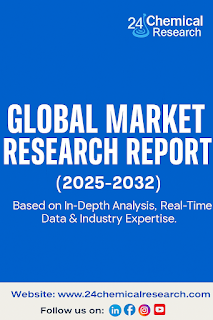Gibberellic Acid Market Hits USD 1.65 Billion by 2032 at 8.3% CAGR – Yield Boost Drives Surge
Global Gibberellic Acid market is experiencing robust
expansion, with its valuation reaching USD 890 million in 2024 and
projected to grow at a CAGR of 8.3%, achieving USD 1.65 billion by
2032. This plant growth regulator significantly enhances crop yields and
quality across diverse agricultural applications, driving its increasing
adoption worldwide.
Download FREE Sample Report: https://www.24chemicalresearch.com/download-sample/261472/global-gibberellic-acid-forecast-market-2024-2030-969
Market Overview & Regional Analysis
Asia-Pacific
commands 55% of global Gibberellic Acid consumption, with China and India
leading demand due to intensive horticulture and cereal production. The
region’s expanding population and shrinking arable land are pushing farmers
toward yield-enhancing solutions. Meanwhile, North America shows strong uptake
in vineyard management and high-value crops, where precision agriculture
techniques optimize Gibberellic Acid applications.
Europe
maintains stringent regulations but demonstrates growing acceptance in organic
farming systems. Latin America emerges as a hotspot, with Brazil’s sugarcane
sector and Mexico’s fruit orchards driving 12% annual growth. African nations
are gradually adopting the technology, though infrastructure limitations temper
market penetration.
Key Market Drivers and Opportunities
The
market thrives on pressure to boost agricultural productivity amidst climate
change and land constraints. Gibberellic Acid’s ability to break seed dormancy
and stimulate plant growth makes it indispensable for modern farming. The
compound delivers measurable results: 20-25% yield increases in wheat, 30%
faster germination in barley, and enhanced fruit size in citrus and table
grapes.
Emerging
applications in cannabis cultivation and tropical fruit production present
lucrative opportunities. The rise of vertical farming and hydroponics further
expands potential use cases. Manufacturers are innovating with slow-release
formulations and combining Gibberellic Acid with other plant growth regulators
for synergistic effects.
Challenges & Restraints
Variable
efficacy across crops and environmental conditions requires careful dosage
calibration, while residue management concerns prompt regulatory scrutiny in
key markets. The high purity requirements for pharmaceutical-grade Gibberellic
Acid elevate production costs, limiting adoption in price-sensitive regions.
Alternatives
like brassinosteroids and synthetic plant growth regulators compete for market
share. Additionally, inconsistent raw material supply from fungal fermentation
processes occasionally disrupts manufacturing schedules.
Market
Segmentation by
Type
- Powder
- Tablet
- Solution
Market
Segmentation by
Application
- Cereals & Grains
- Fruits & Vegetables
- Oilseeds & Pulses
- Turf & Ornamentals
- Others
Competitive Landscape
Key
manufacturers are investing in fermentation technology upgrades and strategic
partnerships with agricultural extension services. Product differentiation
through customized formulations for specific crops is becoming prevalent.
Regional players dominate local markets while multinationals focus on
high-value specialty crops.
Significant
industry developments include bioengineering advancements to enhance
Gibberellic Acid production yields and the development of foliar-applied
nanoformulations. Sustainability initiatives are pushing wastewater treatment
improvements in manufacturing facilities.
Report Scope
This
comprehensive analysis covers the global Gibberellic Acid market from
2024-2032, featuring:
- Country-level market sizing
and forecasts
- Detailed value chain
analysis
- Pricing trend analysis by
region
- Regulatory landscape
assessment
- Clinical trial insights (for
medical applications)
- Emerging application deep
dives
The
report profiles 22 major companies with manufacturing capacity assessments,
recent developments, and market strategies. It also benchmarks production costs
across regions and analyzes the impact of trade policies on market dynamics.
Get Full
Report Here: https://www.24chemicalresearch.com/reports/261472/global-gibberellic-acid-forecast-market-2024-2030-969
Other
related reports
https://www.24chemicalresearch.com/reports/287744/pla-3d-printer-filament-market
https://www.24chemicalresearch.com/reports/200628/global-acetophenone-market-2023-2029-934
https://www.24chemicalresearch.com/reports/125027/global-ppta-fiber-market-2022-2028-518
https://www.24chemicalresearch.com/reports/197451/heme-market-2023-2028-154
About
24chemicalresearch
Founded
in 2015, 24chemicalresearch has rapidly established itself as a leader in
chemical market intelligence, serving clients including over 30 Fortune 500
companies. We provide data-driven insights through rigorous research
methodologies, addressing key industry factors such as government policy,
emerging technologies, and competitive landscapes.
- Plant-level capacity
tracking
- Real-time price monitoring
- Techno-economic feasibility
studies
With a
dedicated team of researchers possessing over a decade of experience, we focus
on delivering actionable, timely, and high-quality reports to help clients
achieve their strategic goals. Our mission is to be the most trusted resource
for market insights in the chemical and materials industries.
International:
+1(332) 2424 294 | Asia: +91 9169162030
Website: https://www.24chemicalresearch.com/
Follow us
on LinkedIn: https://www.linkedin.com/company/24chemicalresearch
.jpg)



Comments
Post a Comment